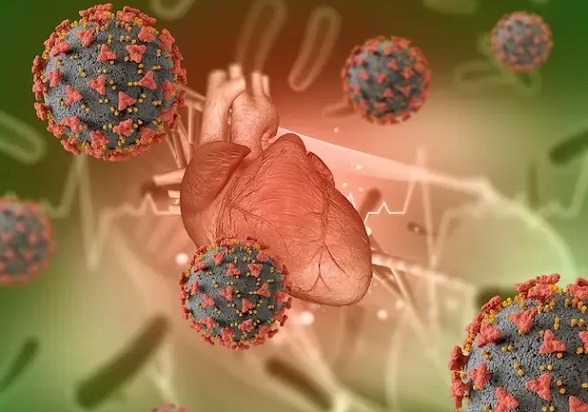Omicron COVID-19 Variants Linked to Direct Heart Damage and Dangerous Irregular Heartbeats
Nikhil Prasad Fact checked by:Thailand Medical News Team Jun 24, 2025 7 months, 2 weeks, 5 days, 21 hours, 23 minutes ago
Medical News: In a concerning discovery that could reshape our understanding of COVID-19’s impact on the heart, scientists in China have uncovered how the Omicron variant directly causes heart injury and dangerous irregular heart rhythms by hijacking protein signaling in different regions of the heart. Using advanced research methods on rhesus macaques—close relatives of humans in biological terms—this study brings to light how even milder COVID strains like Omicron may pose severe hidden risks to heart health.
 Omicron COVID-19 Variants Linked to Direct Heart Damage and Dangerous Irregular Heartbeats
Omicron COVID-19 Variants Linked to Direct Heart Damage and Dangerous Irregular Heartbeats
This
Medical News report focuses on the collaborative research conducted by scientists from the State Key Laboratory of Common Mechanism Research for Major Diseases and the Department of Biochemistry and Molecular Biology at the Institute of Basic Medical Sciences, Chinese Academy of Medical Sciences and Peking Union Medical College in Beijing. Additional research was carried out at the National Kunming High-Level Biosafety Primate Research Center in Kunming.
How Omicron Targets the Heart
The researchers examined heart tissue samples from rhesus macaques infected with the Omicron variant of SARS-CoV-2. Their findings confirmed that the virus was present in the heart, indicating that the Omicron strain is capable of infecting cardiac tissue directly. Classic signs of heart damage, such as hemorrhage, inflammation, cell shrinkage, and tissue scarring were observed—similar to what has been seen in human COVID-19 patients.
But more strikingly, the study used phosphoproteomic analysis—a technique that maps chemical changes in proteins—to show how the virus affects specific regions of the heart in different ways. One of the most critical discoveries involved the left atrium, a key chamber in the heart. It had the highest viral load and showed extreme disruptions in kinase activity—kinases being enzymes that regulate heart rhythm and inflammation.
Triggering Dangerous Arrhythmias Through Calcium Disruption
The study identified two enzymes, CAMK2A and CAMK2G, which were highly activated in infected heart tissue. These enzymes trigger the phosphorylation (chemical alteration) of another protein called RYR2 at the S2031 site. This change leads to calcium leaking from the heart’s sarcoplasmic reticulum, a process that can result in serious heart rhythm disturbances known as arrhythmias.
Previous drugs such as KN-93, a CAMK2 inhibitor, have shown promise in treating such arrhythmias. The researchers suggest that these drugs could be repurposed to treat Omicron-induced cardiac complications.
AKT3 and Metabolic Imbalance Also Involved
The left atrium also showed increased activity of the kinase AKT3, which affected proteins linked to calcium signaling and energy regulation. The AKT3-driven changes may be tied to conduction system diseases—problems in the electrical system of the heart. Targeting th
is pathway might help prevent cardiac complications in COVID-19 patients.
The virus didn’t just disrupt electrical activity. It also altered metabolic functions across all heart regions. For example:
-The left atrium had changes in lipid metabolism.
-The left ventricle showed abnormal nucleotide metabolism.
-The right atrium was affected in carbohydrate metabolism.
-The right ventricle had disrupted energy metabolism.
A key protein, HK2, which supports carbohydrate metabolism and helps cells survive stress through autophagy, was found to be upregulated in three of the four heart regions. Researchers propose this as another potential therapeutic target to reduce damage.
Blood Clots and Long COVID Links
The study also highlighted another major concern: an increase in complement and coagulation activity in the left ventricle. This may explain why many hospitalized COVID-19 patients experience blood clots or heart dysfunction. Elevated levels of proteins like CF1 and F12 were seen, which are known to trigger clot formation. Notably, some of the same proteins were also found in Long COVID patients, suggesting a link between heart injury and prolonged COVID symptoms.
Limitations and Future Directions
Though the findings are compelling, the researchers acknowledge certain limitations. The study was based on a small sample of rhesus macaques and did not account for sex-based differences. Moreover, while non-human primates provide close models, human studies are still essential. Still, the data underline the urgent need for cardiac monitoring and potential therapeutic interventions even in Omicron infections, previously considered less severe.
Final Thoughts
This landmark study reveals that even the “milder” Omicron variant is far from harmless. It can directly damage the heart by triggering dangerous protein signaling changes, causing rhythm issues, inflammation, and blood clots. It also uncovers multiple new targets for treatment, including kinase inhibitors like KN-93 and pathways involving AKT3 and HK2. As more people continue to recover from COVID-19 while still facing long-term complications, these insights are crucial for developing future therapies and guiding patient care.
The study findings were published in the peer reviewed journal: MedComm.
https://onlinelibrary.wiley.com/doi/10.1002/mco2.70266
For the latest COVID-19 News, keep on logging to Thailand
Medical News.
Read Also:
https://www.thailandmedical.news/news/sars-cov-2-destroys-heart-cell-mitochondria-leading-to-dangerous-long-covid-cardiac-issues
https://www.thailandmedical.news/news/polish-study-shows-that-covid-19-disrupts-heart-hemodynamics
https://www.thailandmedical.news/news/scientists-uncover-immune-clues-and-blood-markers-behind-covid-19-heart-inflammation
https://www.thailandmedical.news/articles/coronavirus
